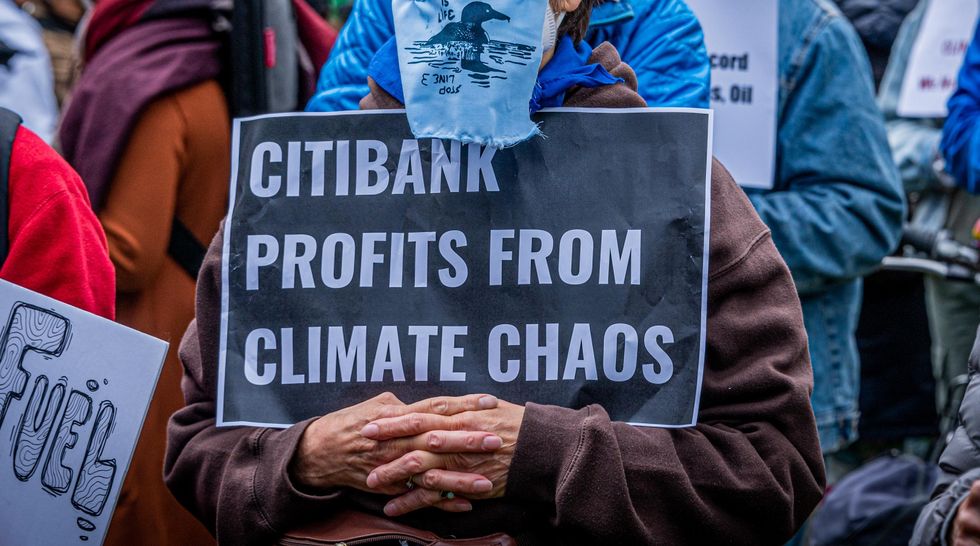
Top banks in the United States and around the world have made a show of embracing net-zero emissions pledges, portraying themselves as allies in the fight against the global climate emergency.
But a new analysis published Tuesday by a group of NGOs makes clear that the world’s leading financial institutions—including major Wall Street banks such as Citigroup, JPMorgan Chase, and Bank of America—are still pumping money into fossil fuel expansion, bolstering the industry that is primarily responsible for worsening climate chaos.
According to the report, 56 of the largest banks in the Net-Zero Banking Alliance (NZBA)—a coalition convened by the United Nations—have provided nearly $270 billion in the form of loans and underwriting to more than 100 “major fossil fuel expanders,” from Saudi Aramco to ExxonMobil to Shell.
Additionally, 58 of the biggest members of the Net-Zero Asset Managers (NZAM) initiative—including the investment behemoths BlackRock and Vanguard—held at least $847 billion worth of stocks and bonds in more than 200 large fossil fuel developers as of September.
Both the NZBA and the NZAM are under the umbrella of the Glasgow Financial Alliance for Net-Zero (GFANZ), a campaign launched in 2021 with the goal of expanding “the number of net zero-committed financial institutions.” Climate advocates have long argued that net-zero pledges are fundamentally inadequate to the task of stopping runaway warming.
“The science is very clear: we need to stop developing new coal, oil, and gas projects as soon as possible if we want to meet our climate goals and avoid a worst-case scenario,” said Lucie Pinson, the executive director and founder of the watchdog group Reclaim Finance. “Yet, it is business as usual for most banks and investors who continue to support fossil fuel developers without any restrictions, despite their high-profile commitments to carbon neutrality.”
“Their greenwashing is all the more damaging as it casts doubt on the sincerity of all net-zero commitments and undermines the efforts of those who are truly acting for the climate,” Pinson added.
The groups found that the U.S.-based Wall Street giants Citigroup, JPMorgan Chase, Bank of America, Morgan Stanley, and Wells Fargo provided nearly $90 billion in total financing for fossil fuel expansion between the dates they joined the NZBA and August 2022.
Citigroup, which touts its net-zero commitments on its website, led the pack with $30.5 billion in fossil fuel financing from April 2021 to August 2022.
“The U.S. financial sector cannot be taken seriously on climate change until it stops investing in new fossil fuel projects,” said Adele Shraiman, a representative for the Sierra Club’s Fossil-Free Finance campaign. “We need an urgent transition to a green economy and the financial sector must help deliver that.”
Overall, according to the new report, “229 of the world’s largest fossil fuel developers received finance from the 161 GFANZ members covered… which will support them to develop new coal power plants, mines, ports, and other infrastructure, as well as new oil and gas fields and pipelines and LNG terminals.”
“These new fossil fuel projects are incompatible with the objective of limiting global warming to 1.5°C, as confirmed in the latest International Energy Agency’s World Energy Outlook published in October 2022,” the report states. “They will lock in greenhouse gas emissions for decades, despite the adoption of decarbonization targets by some GFANZ members.”
Paddy McCully, a senior analyst at Reclaim Finance, said in a statement that “GFANZ members are acting as climate arsonists.”
“They’ve pledged to achieve net-zero but are continuing to pour hundreds of billions of dollars into fossil fuel developers,” said McCully. “GFANZ and its member alliances will only be credible once they up their game and insist that their members help bring a rapid end to the era of coal, oil, and fossil gas expansion.”




